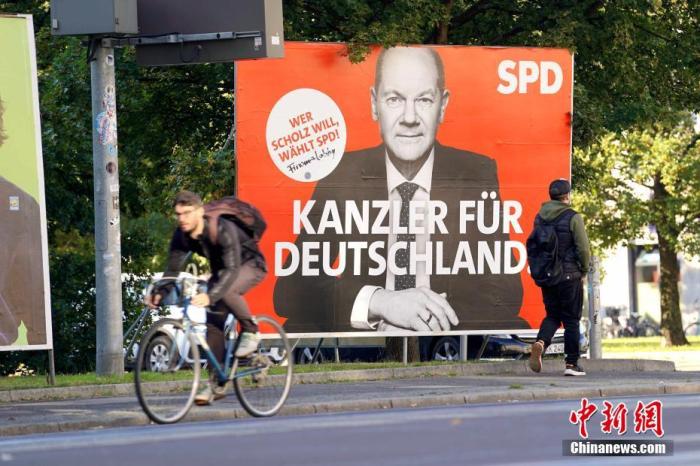Chinanews.com, September 27th. Comprehensive report, the German Bundestag election results were on the 27th, and the Social Democratic Party led other political parties with 25.7% of the vote. Chancellor Merkel’s coalition party suffered a major setback and set the worst result in decades. .
However, the Social Democratic Party leads only by a narrow margin, and the next few weeks of difficult coalition government formation negotiations may follow.
According to foreign media analysis, the final decision on the formation of the cabinet will largely be in the hands of the two smaller parties, the Green Party and the Liberal Democratic Party, and they must determine whether to form a team with the Coalition Party or the Social Democratic Party.
On September 26, local time, pedestrians passed the billboard of the Berlin Street Union Prime Minister candidate Raschett.
Photo by China News Agency reporter Peng Dawei
Merkel party defeated
Conservative forces fade?
The German Bundestag election ended on the 26th. According to the preliminary results announced by the Election Committee on the 27th, the German Social Democratic Party received 25.7% of the votes and the Union Party received 24.1% of the votes.
The Social Democratic Party defeated the Coalition Party and became the largest party in the parliament.
It is worth noting that at the end of the Merkel era, her coalition party had the worst results and suffered a major setback.
The Associated Press stated that the worst general election result for Merkel's camp was in the first post-war democratic election in 1949, when the vote was 31%.
The German weekly "Focus" previously commented that the Merkel era ended in a historic disaster for the Alliance Party.
This year's German general election plunged the League Party into a historic defeat.
The Coalition Party tried to continue in power without a major policy break after Merkel was in power for 16 years. This strategy was not welcomed by voters.
Rashett, the coalition candidate for prime minister, who pined his hopes on conservative voters, did not do so.
On September 26, local time, pedestrians passed the billboard of Schultz, the candidate for Prime Minister of the Social Democratic Party on the streets of Berlin.
Photo by China News Agency reporter Peng Dawei
Cabinet negotiations may last for several weeks
The two smaller parties have the final say?
British media said that after the vote, Raschelt and the SPD candidate for Chancellor Scholz were both vying for the post of German Chancellor.
The Social Democrats took a narrow lead in this unusually stalemate campaign, and it looks like the next few weeks will be difficult negotiations on the formation of a coalition government.
Scholz said he hopes the alliance negotiations will be concluded before Christmas.
He celebrated the results of the election at the Berlin Social Democratic Party’s party headquarters and opened a red plate.
He told a group of cheering supporters that voters had made it clear that he wanted him to be the "next prime minister."
He said: "We have the ability to govern a country... Let us wait for the final result, but then we will start working."
Rashet also called for the formation of a government before Christmas. He said: "We cannot be satisfied with the results of the election... We will do everything we can to build a conservative-led government, because the Germans now need a government that modernizes our country. The future alliance...this may be the first time we have a government composed of three partners."
Annalena Belbok, the candidate for the Green Party’s prime minister, admitted that although her party won more votes than in the last federal election, it did not perform as expected.
Although the Green Party has no chance to obtain the post of prime minister, they can play a role in the next ruling coalition.
According to the analysis of German media, the "grand alliance" between the current ruling coalition party and the Social Democratic Party will be the only possible combination of the two parties, but the Social Democratic Party has expressed little interest in this before the election.
Among the three-party combinations, the so-called "Jamaica" combination of the Coalition Party, the Green Party, and the Liberal Democratic Party is possible, and the "traffic light" combination of the Social Democratic Party, the Green Party, and the Liberal Democratic Party is also possible.
Whether it is a "traffic light" or "Jamaica", the Green Party and the Liberal Democratic Party will enter the ruling coalition.
British media analyzed that the final decision on the formation of the cabinet will largely be in the hands of the two smaller parties, the Green Party and the Liberal Democratic Party, and they must determine whether to form a team with the Coalition Party or the Social Democratic Party.
Once the new government is established, the President of Germany will nominate a prime minister, who will be elected by the Bundestag.
This is usually the main candidate for coalition partners in a newly formed government.

